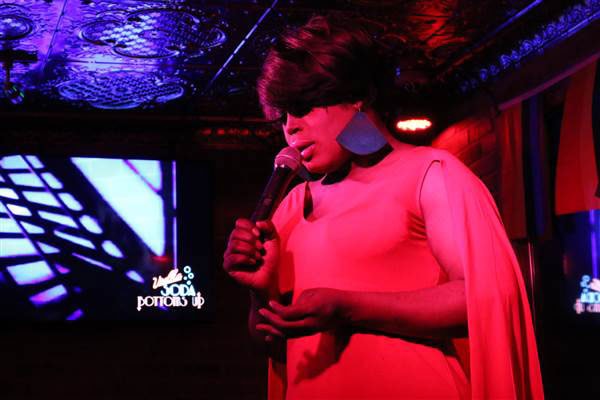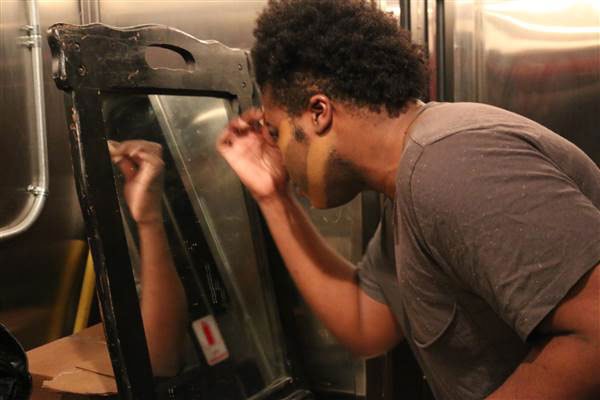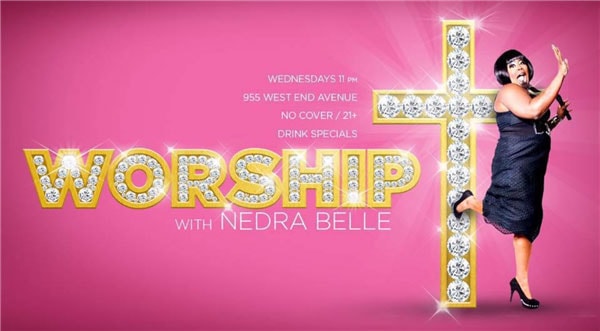Christian Drag Queen Nedra Belle Finds Acceptance in Church
May 18 2017 – “I’m sorry I’m running late, church got out late,” Chris Weaver, also known as drag queen Nedra Belle, said as he entered the gay bar. He came straight from performing in two church services with the praise team to the gay bar for his weekly show Sermon.
“But you know black church,” he said, pouring his makeup bag all over the counter in an unused service area of the gay bar. “We always running late.”
Born and raised in Long Island, NY, 29-year-old Chris Weaver says it was his godmother who first took him to church. “When I was about three, my godmother used to take me to church. I would come back and put on my dad’s shirt and preach the message we heard that day,” he said.

It was in Iowa that Chris grappled with, and eventually accepted, his sexuality. He quietly began to go to local gay bars, but his church soon found out. The megachurch was part of the Evangelical Lutheran Church of America, a denomination which allows individual churches to be affirming of LGBT people. Unfortunately, his church was not.
Chris was faced with two options: go see a counselor for his sexual orientation or leave. He decided to leave the church, realizing he was at peace with his sexuality and didn’t want to attempt to futilely change his sexual orientation.
Chris’s church wasn’t the last time he felt rejection. His mother has also condemned him for his sexual orientation.
“My mom asked me what type of girls I was into and I like to joke around so I told her I was pregnant,” Chris said, laughing as he applied his eyeliner. “She laughed about it and I finally said, ‘No, really, I have to tell you something. I’m gay.'”
Chris says it’s a combination of his mother’s Jamaican heritage and strong conservative Christian beliefs that makes her unaccepting of his sexuality and his drag.
“You’ll hear her say, ‘I just don’t want you to struggle,'” Chris said. “And I’ll go, ‘Struggle? I’m having the most fabulous time of my life.'”
When Chris left that church, he wasn’t sure he would work at another one again. He just needed a place that would allow him to exist as a gay Christian. He wasn’t sure he would get another job at a house of worship, let alone find one he could attend.
But a chance encounter in New York City’s subway led him back.

“The church that I am at now, I didn’t find it. It found me,” Chris said. “I had just moved back a day or two before New Year’s Eve. This man comes up to me on the subway and tells me, ‘You sing.’ I wasn’t even singing at the time but he just said he knew I sang. He asked me to sing something for him so I sang something for him in the subway.”
Chris sang on the subway, bringing the entire train cart to complete silence, then applause, he said. The man who asked him to sing worked at a church, invited him to visit the following days, and offered him a position on the worship team.
“They know I’m gay. That wasn’t a problem,” Chris told me about Zoe Ministries, the black church described as prophetic with roots in Pentecostalism. Still, he was worried about introducing his drag persona to the church team.
“I told one of the prophetesses I did drag. She thought it was fierce. She encouraged me to tell my bishop,” Chris said. The reaction was more than he could have hoped for.
“For our Christmas special last year, one of the guys during our meeting suggested I do the Christmas special in drag — ‘Nedra’s Christmas.’ The bishop loved it,” he says. “I go ‘No, no, no. I will not do drag in the church. I will not.'” But the idea was sold and the show went on.
Still, Chris had reservations about doing drag in church or mixing his drag with his faith. For his first weekly show, a club owner suggested the name Worship due to Chris’s involvement with his church and his tendency to lip sync, and live sing, to gospel music.

“I was very much against it. I didn’t want to make a mockery of the church,” Chris said. “I was worried about what the church people would think. One church friend said to me, ‘You may not know this, but what you do out there is you’re ministering to gay people.’
“The thing with gay people, a lot of us say we don’t’ believe in God or are atheists,” Chris said. “They don’t really believe that. Well, some do. But a lot of it is Church hurt. You’re not mad at God, you’re mad at people.”
Chris’s statements are backed by a Pew Research report which shows almost half of lesbian, gay and bisexual people identify as Christian. A smaller percentage also identifies with Islamic, Jewish, or Hindu beliefs.
“One of the first times I did a gospel number, I went out to the patio of the gay bar and this girl comes up to me and says, ‘I don’t even believe in God, but after that number you make me want to believe.'” And that’s happened to me multiple times,” Chris said, putting on his wig and making the final transformation to Nedra.
“Drag is an opportunity, a way to reach people,” Nedra said. “People want this relationship with Christ. But they don’t feel there’s a place they can go and do that. Maybe my shows help do that.”
After an application of lipstick and after the gospel track “He Lives” begins to play, Nedra’s ready for the stage.